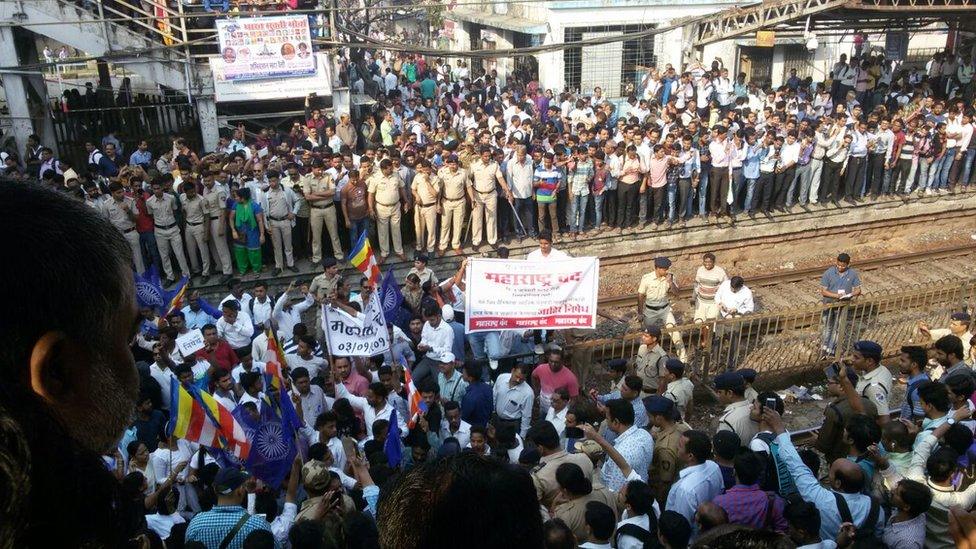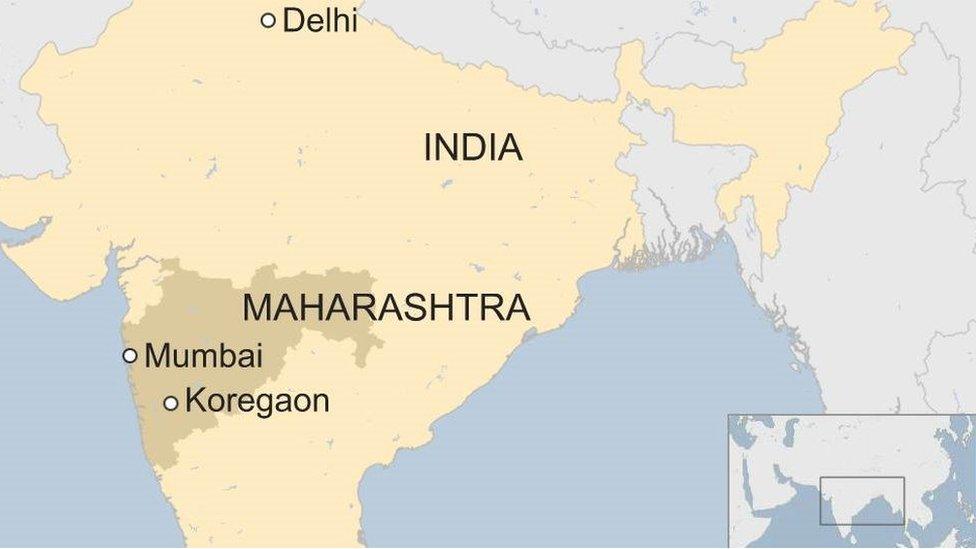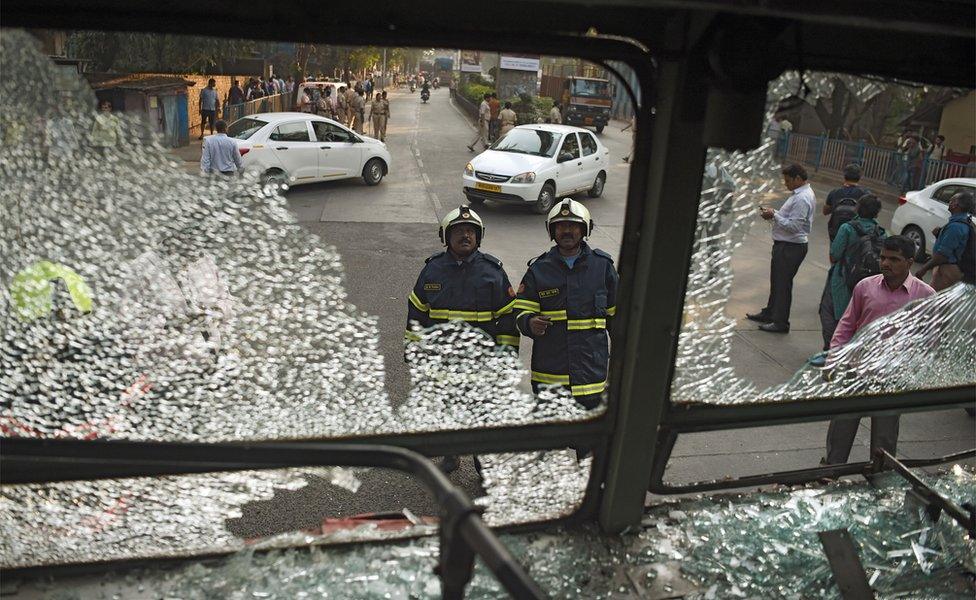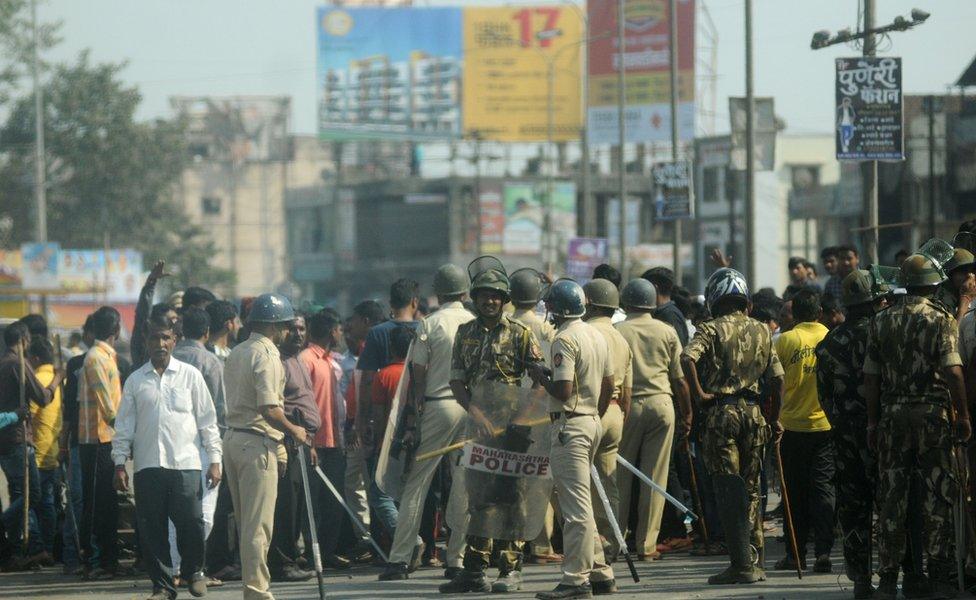Indian Dalit recalls protest that paralysed Mumbai
- Published

Protests in Mumbai disrupted transport services
Thousands from India's low-caste Dalit community protested against right-wing Hindu groups in the western city of Mumbai earlier this month, bringing the city to a halt. Nehali Upasham explains why she took part.
I work and live in Mumbai but every year, on 1 January, I visit a village called Bhima Koregaon four hours away, for a festival that commemorates a battle where Dalits (formerly known as untouchables) helped defeat an upper-caste ruler.
Usually, since thousands of Dalits visit the site of the battle on this day, one sees many stalls selling items such as food and medicines or books and films on Dalit history.
But something seemed wrong this year. Many of the stalls were shut.
This was all the more surprising because 2018 marks the 200th anniversary of the Battle of Koregaon. On 1 January 1818, Dalits fought alongside British colonial forces to defeat an upper caste ruler, in what my community calls the first battle against caste oppression.
People gather around the "victory pillar", an obelisk-shaped memorial in Bhima Koregaon, to honour the courage that this day represented for Dalits.
I have been doing this ever since I was a child. I am also married to a man who was born in this village - so my connection to this place is stronger now.
This year, I was setting up a stall on behalf of a production house that I manage along with some other women. We produce videos and run a YouTube channel about Dalit empowerment.
What happened in Bhima Koregaon?
We were in the parking lot unloading materials when I realised there was trouble. A group of men approached us and told us that we could not put up any stalls and we should "get out" of the village.
Although they appeared threatening, we chose to ignore them.
Nearly an hour later, we found that we could not use our phones to make calls because we weren't able to access the network.

Dalits defeated an upper caste ruler in a battle in Bhima Koregaon
My brother-in-law, who had gone back to the parking lot, returned with the news that the windows of our car had been shattered. And he said he had to flee from what looked like a mob of more than a 100 men, all of whom were holding saffron flags [which are commonly used by right-wing Hindu groups].
When we went out to the parking lot, we saw people running.
And then the mob started running towards us. People started pelting stones at us from their balconies. Vehicles with symbols of Buddhism or those that displayed images of Dalit icons were targeted.
An elderly man threw a large stone at a bus that had an 'Ashok Chakra' [a blue wheel that is a symbol of Buddhism] on it. [Dalits who have converted to Buddhism display these symbols on their vehicles.]
Through all this, the police failed to protect us.
We fled towards a neighbouring village but villagers prevented us from entering. They said: "You cannot wait here because they will burn our houses."
We had no choice but to walk until we were a safe distance from Bhima Koregaon.
Why I joined the Mumbai rally
I took part in the protests on the streets of Mumbai to get justice for what happened to us - Dalits - in Bhima Koregaon.
On that day in Bhima Koregaon, there were those like me who were there to represent justice and our struggle for it. But there were also others who were representing their individual agendas.

Buses were attacked as Mumbai protests turned violent
But what was worse than the violence itself was the discussion that it kicked off on social media.
It made me realise how little people knew of Dalit history or their status during British colonial rule. Some of my colleagues provoked me to react on social media and then humiliated me.
They didn't treat me like a human being. They reduced my existence to my caste.
Some people commented that this should happen to "them" [Dalits] since "their" status has progressed only because of "reservations" or quotas based on caste.
Others said that while upper castes pay taxes, Dalits enjoy the benefits, adding that perhaps Dalits should go to Britain to "beg" for quotas since they had fought alongside British forces in the Koregaon battle.

One man was killed in the clashes in Bhima Koregaon
The comments don't surprise me since I have been hearing similar statements for a long time.
Every time there is violence against Dalits, everyone blames the caste-based quotas in India.
I want to know why is there so much anger and discrimination against Dalits? What does anyone truly gain from this?
Aren't we - Dalits - human like the rest of them?
More than a week has passed since the events in Bhima Koregaon but I can't forget what I saw.
Now it's become a matter of our identity. So, we will fight until we get justice.
We, the followers of BR Ambedkar [an iconic Dalit leader], believe in peace and I believe those who share our beliefs will never indulge in violence.